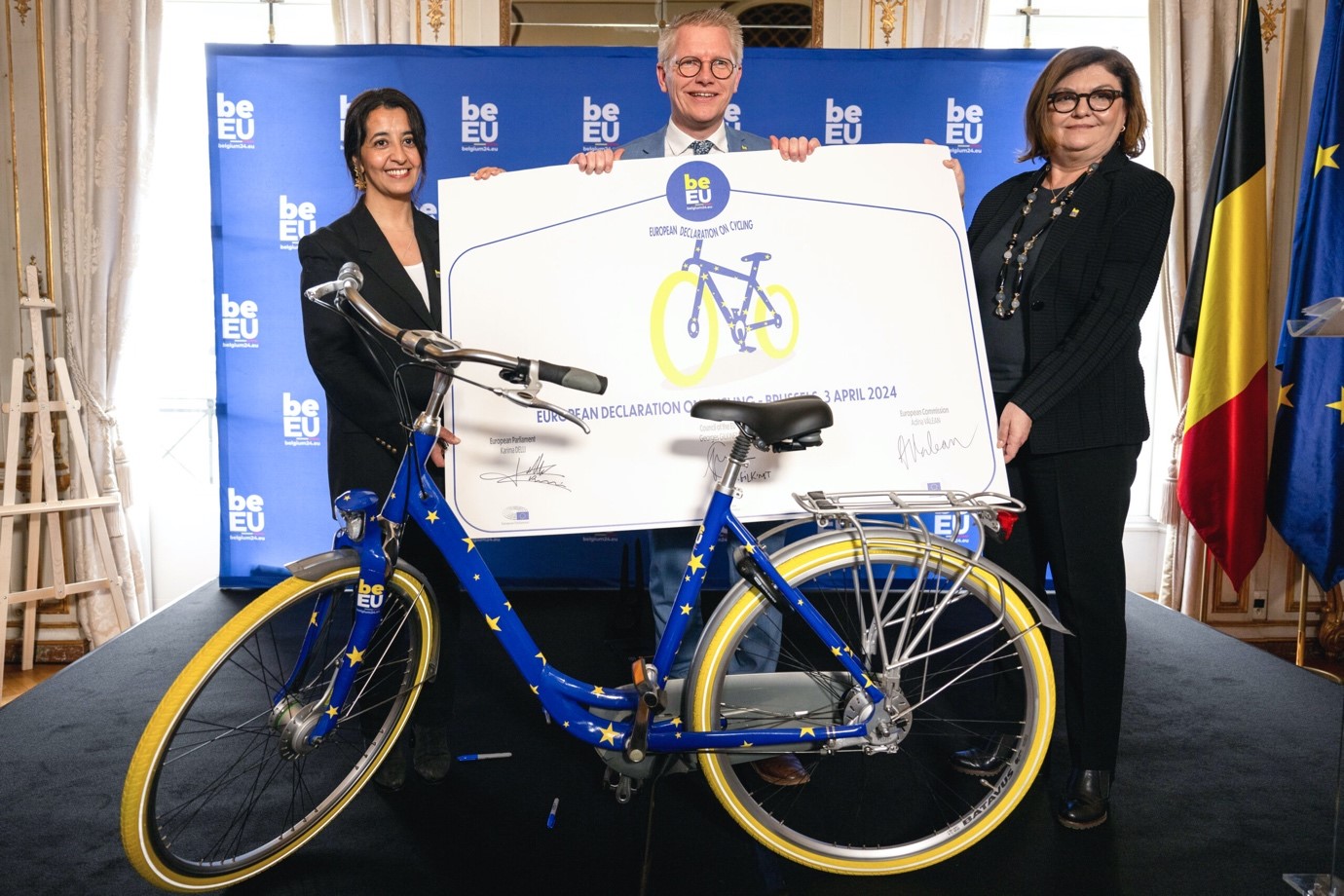As per their website, CONEBI has applauded the signing of the European Declaration on Cycling by EU leaders in Brussels. They state that the Declaration marks a significant step forward in promoting the advantages and growth of cycling and the cycling industry throughout the European Union.
Although it has no legal effect, cycling enthusiasts have welcomed a commitment by governments and MEPs to make Europe a more bike-friendly place as a significant recognition of the health and environmental advantages, as well as a potential watershed moment in EU transportation policy.
EU nations agreed, committing to develop additional cycling lanes and secure parking spaces, enhance rider safety, and support projects to stimulate the transition from four to two wheels and committed to significantly increasing “safe and coherent cycling infrastructure across Europe” and increase safety for cyclists.
Adina Vălean, European Commissioner for Transport, who signed on behalf of the EU executive, highlighted the benefits of cycling., “It reduces pollution, eases urban congestion, and promotes healthier lifestyles. Moreover, cycling is a cornerstone of the European industry, driving innovation and growth while creating high-quality local jobs. Embracing cycling aligns with the EU’s industrial strategy and objectives.”
Karima Delli, Member of the European Parliament and Chair of the Transport Committee stated that she was "very proud" that the European Parliament's resolution resulted in this joint declaration on cycling across the three primary bodies of the European Parliament, the EU Council, and the EU Commission.
She said, “Cycling is a fantastic means of transport, good for health, the climate and employment, and a great industrial challenge for the European Union. The industrial stakes are high, and the aim is nothing less than to develop a genuine European bicycle industry, ultimately producing “Made in Europe” bicycles.
“This is a historic moment, and an excellent first step towards a strong European policy in favor of cycling.” She is convinced they can move away from the “car-centered approach” and can replace it with active mobility and suitable public transport. She said the Declaration is a “logical step in that direction”.
Belgium's Deputy Prime Minister and Minister of Mobility, Georges Gilkinet, said that this is the first time an agreement like this for cycling has been signed at the European level.
He said, “It is a historic step that Europeans can unite around. Cycling is not limited to a specific group but enjoys widespread support and agreement among European stakeholders. The Declaration highlights that there is broad support around the table highlighting the benefits of cycling in areas such as tourism, the economy, climate, and health. Considering this achievement, I would like to have one of the upcoming five years as the European Year of Cycling.”

Ms. Karima Delli, Mr. Georges Gilkinet, and Ms. Adina Vălean (left to right) display the declaration surrounded by EU insignia.
The European Declaration on Cycling is made up of eight chapters and 36 promises targeted at increasing cycling and supporting the achievement of climate targets following the European Green Deal's aims. It emphasizes the importance of cycling as a sustainable and healthy method of transportation, asking Member States to prioritize the development of cycling infrastructure, safety measures, and policies that encourage active mobility.
CONEBI collaborated with the European Cyclists' Federation (ECF) and Cycling Industries Europe (CIE) on the advocacy request for a European Cycling Declaration, with a specific focus on the Cycling Industry chapter.
Erhard Büchel, CONEBI President, further added, “The EU’s endorsement of this Declaration sends a strong message about the prioritization of Cycling and its recognition as a key element of sustainable mobility. It will be a guiding compass for EU and national policymakers, and we will monitor the developments stemming from the eight chapters.
“Among them, we are also glad about the one directly linked to the industry, which is about supporting quality green jobs and the further development of our sector in Europe. Greater uptake of cycling means indeed more quality local jobs too and its role is also beneficial to the EU economy – contributing to the objectives of the current and future EU industrial strategy.”
Toni Grimaldi, Cycling Industries Europe (CIE) President, said, “There is no reason to wait to grow cycling in Europe. It is a win-win for mobility transition, job creation, economic growth, and promotion of local companies – it’s all available now, all affordable now. Let’s develop a world-class European cycling industry and give a boost to European leadership!”
Jill Warren, European Cyclists’ Federation (ECF) CEO, said, “Today, we celebrate the adoption of the European Cycling Declaration as a truly historic achievement. This declaration holds the potential to unlock the benefits of cycling for millions of European citizens, reflecting many of ECF’s longstanding advocacy and policy demands. With cycling elevated to a strategic priority, we stand ready to support the institutions in realizing its full potential as a healthy and sustainable means of transport.”
This latest proclamation was supported by the European Parliament, which had called on the EU executive to adopt a specific cycling plan to double the number of kilometers cycled throughout the union by 2030.
Manuel Marsilio, CONEBI General Manager, concluded by saying, “Through collaboration, advocacy, and continuous dialogue with policymakers, we strive to support the objectives of the European Green Deal.”
This latest commitment joins pro-cycling EU member states Belgium, Luxembourg, Austria, Ireland, Denmark, and the Netherlands, which issued their own declarations in 2022. They were later joined by another ten, including France and Spain.







